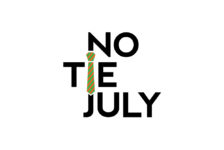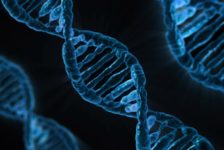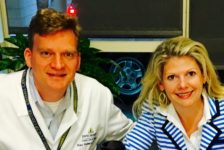In the Making a Difference series, KCCure’s Director of Patient Engagement, Laura Loughlin will be highlighting organizations making a difference in Kidney Cancer research. In this first article, we’re profiling work being done at the Broad Institute researching rare kidney cancer.
The Broad Institute of Cambridge and Harvard
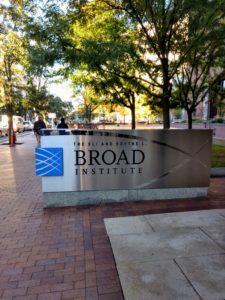 Located in Cambridge, MA the Broad is a non-profit research organization partnered with MIT, Harvard and the five Harvard teaching hospitals. On October 18th I had the opportunity to visit the Broad. I attended a Pre-Launch Workshop for the Rare Cancer Dependency Map Initiative. This initiative provides a patient driven research platform seeking treatments for rare kidney cancers. The research starts with patients’ authorizing donation of fresh tissue and fluids, both normal cells and tumor cells, gathered at the time of surgery or biopsy. Either original tumor samples, or metastatic, can be donated. Todd Golub, Broad Institute Chief Science Officer and David Sandak, Rare Cancer Research Foundation, opened the meeting for the day sharing their vision and commitment to this incredible initiative.
Located in Cambridge, MA the Broad is a non-profit research organization partnered with MIT, Harvard and the five Harvard teaching hospitals. On October 18th I had the opportunity to visit the Broad. I attended a Pre-Launch Workshop for the Rare Cancer Dependency Map Initiative. This initiative provides a patient driven research platform seeking treatments for rare kidney cancers. The research starts with patients’ authorizing donation of fresh tissue and fluids, both normal cells and tumor cells, gathered at the time of surgery or biopsy. Either original tumor samples, or metastatic, can be donated. Todd Golub, Broad Institute Chief Science Officer and David Sandak, Rare Cancer Research Foundation, opened the meeting for the day sharing their vision and commitment to this incredible initiative.
Rare Cancer Dependency Map Initiative
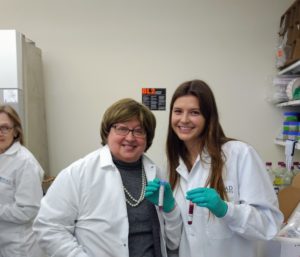 Jesse Boehm, Scientific Director Cancer Dependency Map, reviewed the successes of the 2017-2018 pilot effort and future goals. The Rare Cancer Dependency Map initiative completes analyses of the donated samples to find genetic mutations or dependencies that are necessary for the cancer cells to survive. Once the mutations are documented work is done to find treatments to remove the dependencies and kill the cancer.
Jesse Boehm, Scientific Director Cancer Dependency Map, reviewed the successes of the 2017-2018 pilot effort and future goals. The Rare Cancer Dependency Map initiative completes analyses of the donated samples to find genetic mutations or dependencies that are necessary for the cancer cells to survive. Once the mutations are documented work is done to find treatments to remove the dependencies and kill the cancer.
The Broad catalogs all genes and proteins that are essential for rare cancer cells to grow, multiply and survive with a high degree of accuracy. CRISPR, a genome editing technology pioneered at the Broad, can turn off all 20,000 human genes and determine which ones are needed to keep the cancer cell alive.
The Rare Cancer Dependency Map Initiative requires a supply of cancer cells to work with. The Broad’s Cell Line Factory Project has developed proven methods to grow cell lines from patient samples in the quantities needed to support research. In addition to searching for new treatments the Broad is also testing over 6000 existing drugs to determine if they kill cancer cells.
A tour of the laboratory highlighting the technology and high degree of automation that allows this research to be completed in an accurate and efficient manner was one of the highlights of the day.
Consent to Donate – Pattern.org
Key to the success of this initiative is Pattern.org, a patient directed consent platform. Pattern.org allows patients to authorize donation of fresh normal and tumor cells for research, with a focus on rare cancers. In kidney cancer, the Broad is seeing tissue donations from patients diagnosed with Chromophobe, Translocation, Papillary and other rare cancers. Getting access to this type of tissue is difficult as most kidney cancer patients don’t have biopsies prior to surgery. However, if you have recently been diagnosed with a rare kidney cancer via biopsy and you’re scheduled for surgery, donating your tissue could be an option. Patients who have already had their primary tumor removed can also consider donating tissue from later biopsies or surgeries to remove metastatic disease.
The next article in the Making a Difference series will focus on the Rare Cancer Research Foundation and Pattern.org in more detail.
Everyone Benefits!
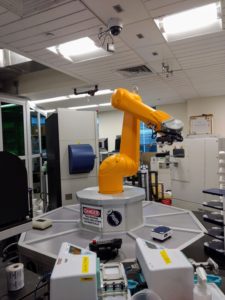 The Broad makes its research public, so everyone benefits. The Broad’s inventory of all models and genomic data can be accessed at here for every rare tumor type. To date DepMap has profiled more than 500 cell lines. Over the next several years the Broad will greatly expand the diversity of cell lines profiled for genetic vulnerabilities with quarterly data release. This inventory will be available to all members of the scientific community — a powerful incentive for sharing across all research organizations.
The Broad makes its research public, so everyone benefits. The Broad’s inventory of all models and genomic data can be accessed at here for every rare tumor type. To date DepMap has profiled more than 500 cell lines. Over the next several years the Broad will greatly expand the diversity of cell lines profiled for genetic vulnerabilities with quarterly data release. This inventory will be available to all members of the scientific community — a powerful incentive for sharing across all research organizations.
I want to take this opportunity to thank Jesse Boehm and the Broad Institute Team for hosting the meeting and providing the tour of the facility. KCCure is proud to promote this important research effort.

